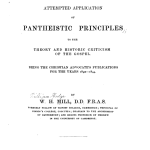Over the break I finished reading Larry Hurtado’s fine book on God in New Testament Theology (Abingdon). It is a short read (just over 100 pages) and surprisingly fills an important niche since there are so few books on “God” in the New Testament, as Nils Dahl complained about a few decades ago.
In the first chapter, Hurtado covers a number of recent treatments on the question of God in the NT. While there have been a good number since Dahl’s call to scholarship on God, there is still work left to be done (especially on NT documents other than the Gospels and from Paul).
The second chapter examines the identity of the NT God. He is not just a general divine figure, according to Hurtado, but the same God of Israel. Specifically, his identity is bound up with his deeds (as in the OT); especially in his acts of “creation, calling, sending forth prophets, rescuing and vindicating, giving commandments, judging and punishing, and most importantly God’s acts in Jesus, sending him forth, handing him over to redemptive death, and raising him and exalting him to superlative glory” (p. 35).
In the NT, we find a greater emphasis of God as Father, especially as Jesus is revealed as Son (p. 38ff).
There is also a strong theme of God as “Living” – both eternal and one who gives resurrection life – to Jesus especially. Hurtado says this: “Jesus’ resurrection is not presented as a restoration to ordinary life but was seen as a catapulting of Jesus into the glorious/glorified life of the world to come” (p. 42). In this chapter (and others) Hurtado repeats his trademark expression that early Christian worship was binitarian, a “mutation” of traditional worship where Yahweh is paid devotion by reference to Jesus. One of my concerns at this point is the vagueness of this language of mutation and reference, but I admit I am not familiar with Hurtado’s work and I have just checked a couple of his books out from the library.
Chapter 3 covers “God” and Jesus in the NT. Hurtado notes that Jesus “is subordinate and subservient to the purposes of “God”” (p. 55). By worshipping Jesus, the early Christians were not serving another god, but saw Jesus as “the unique agent of “God’s” redemptive purposes” (p. 61). Again, “”God” remains typically the ultimate recipient of worship, and the remarkable devotion to Jesus is intended as response to “God’s” installation of Jesus as rightful recipient of this devotion” (p. 64). It stands to reason, for the early Christians, that if Jesus plays such an important eschatological role, he must have also been involved in protological matters, thus reflection on his role in creation (e.g., John 1).
Chapters 4 and 5 are, respectively, on the Spirit and God, and his conclusions. I will stop the review here, as I did not find much noteworthy information to report.
Overall, I felt that it was a very good book because there is almost nothing like it – covering “God” in such a short space, and by a leading NT expert. For those, like me, who are not up-t0-date on all things Hurtado, it was a nice entry point to get the basic argument for his binitarian-devotion theory. He also hits all the major issues, if only briefly. I would give it a 4/5. Thanks Larry!











